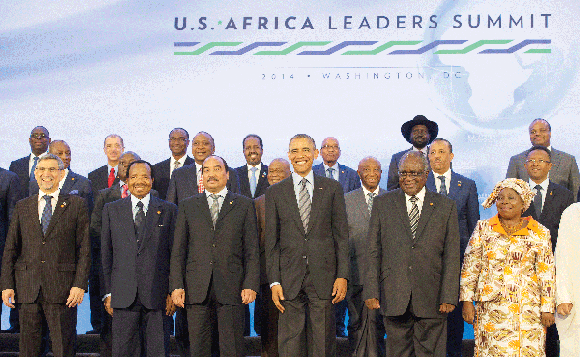Focus on Africa
President welcomes 49 leaders to White House
8/8/2014, 3:49 p.m.

Every day, 250,000 Americans go to work in jobs supported by exports to Africa, government figures show.
Seeking to build on that, President Obama this week welcomed 49 African heads of state to the White House — the biggest such gathering in American history.
“The United States is determined to be a partner in Africa’s success,” the president told the visitors as he announced $33 billion in new investments in the continent aimed at moving ties beyond humanitarian aid and toward more equal economic partnerships.
The bulk of the commitments came from private-sector companies, including Coca-Cola and General Electric, underscoring Africa’s growing appeal on the business front.
The continent is home to six of the world’s fastest-growing economies and a rapidly expanding middle class with increased spending power.
President Obama noted, though, that U.S. trade with Africa is still relatively tiny — with total imports and exports with the entire continent about the same as its trade with Brazil. Only about 1 percent of U.S. exports go to sub-Saharan Africa.
“We’ve got to do better, much better,” President Obama acknowledged. “I want Africans buying more American products and I want Americans buying more Africa.”
And that would be just fine with leaders like Tanzania President Jakaya Kikwete who said that he and others want to move away from a relationship of “aid donor and aid recipient” to one based on investment and trade.
During the summit, the president also committed to renewing the Africa Growth and Opportunity Act, which is set to expire next year. Since 2000, AGOA has been at the center of the U.S. efforts to promote trade and investment in Africa while opening new sources of material for U.S. producers.
The summit brought the leaders of most African nations, though the presidents of Liberia, Sierre Leone and Guinea opted out to deal with the Ebola crisis in their countries.
Four others were not invited, including the leaders of Zimbabwe, The Sudan and Eritrea, who have poor relations with the African Union, and the Central Africa Republic, which has yet to be readmitted to the African Union. Inviting the four would have sent a “bad message” to others who attended, the Obama administration said.
Despite the Ebola outbreak and other issues involving violence and security breakdowns, Africa is now being seen differently.
The lands that once evoked images of famine and chaos are giving way to upward mobility and innovation. Memories of LiveAid and “Black Hawk Down” are being replaced by images of entrepreneurs.
Africa, in short, despite struggles in some countries, is going mainstream.
The summit offered recognition of that change. Still the U.S. is playing catch-up. The summit might be unprecedented for this country but it took place long after similar gatherings hosted in recent years by China, India, Japan and Europe.
Five years ago, China passed America as Africa’s largest trading partner. President Obama considers the summit a first step in restoring America to the No. 1 position.
Still, he noted that Africa must deal with the conditions that retard progress. He urged the leaders to root out corruption and promote an atmosphere that supports foreign investment and trade.
“Capital is one thing, development programs are one thing, but the rule of law, regulatory reform, good government, those are things that matter more,” he told his guests.
Still, the new investments that were announced are regarded as a move in the right direction.
Various leaders said the announced investments fuel optimism about a future of full partnerships in a trade now worth $85 billion a year following meeting after meeting with business leaders eyeing opportunities.
“Today, it’s wide open for us,” said Jeff Immelt, GE’s chief executive. Already in Africa, he announced $2 billion in new investments to boost infrastructure, work skills and access to energy.
Coca-Cola also said it would invest $5 billion with African bottling partners, while IBM’s CEO, Ginni Rometty, said the technology giant plans to invest more than $2 billion.
Another big deal involves a joint venture between a Nigerian company and a U.S. private capital firm that will pump $5 billion into electricity generation in sub-Saharan Africa.
The World Bank also committed $5 billion to support the growth of electrical generation. According to the bank, one in three Africans lack access to residential power despite the repaid economic growth.
Tanzania’s Kikwete told the forum that with President Obama and senior officials encouraging the business community “to take Africa seriously, I think this time we will make it.”
“These deals and investments demonstrate,” U.S. Commerce Secretary Penny Pritzker said, “that the time is ripe to work together as partners in a spirit of mutual understanding and respect — to raise living standards in all of our nations and to address the challenges that impede our ability to develop closer economic bonds.”






